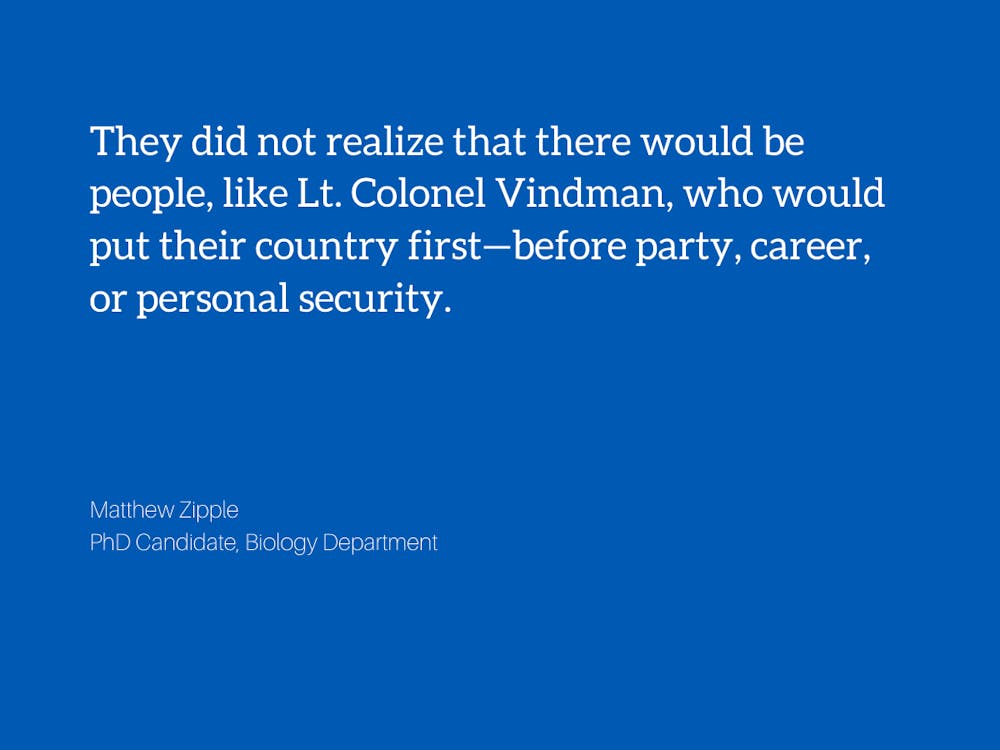In the highly orchestrated theater of the fourth impeaching proceedings in the history of the United States, it can be easy to lose the human element that underlies witnesses’ testimony. But on Tuesday, it was impossible to sit in room 1100 of the Longworth Congressional Building without feeling the humanity that infused the testimony of Lieutenant Colonel Alexander Vindman. I am currently a PhD candidate, studying animal behavior in the Duke biology department, but in my undergraduate studies I also pursued political science and have maintained an interest in political behavior ever since. As an avid institutionalist, I was moved to attend the impeachment hearings in Washington to witness firsthand the profound Constitutional challenge that is currently unfolding. I chose to time my visit to coincide with Lt. Colonel Vindman’s testimony, as I had long perceived him to be an exemplar of American patriotism. I was not disappointed.
As he began his opening statement, Vindman was clearly out of his element testifying before the House Permanent Select Committee on Intelligence—and millions of Americans. But as he walked us through his life story, a story that exemplifies the American dream, he grew in confidence and his voice grew in strength. Following the death of his mother, Vindman’s father took his family and fled the Soviet Union with the hope of building a free life in the United States. He testified that his father taught him an important lesson: America is your home and has given you an opportunity. It is your duty to embrace that opportunity and give back. Vindman heeded his father’s lesson, training as an Army reserve officer in college, joining the Army as a commissioned officer after his graduation, and remaining an officer in the Army for the two decades since. He expressed a clear sense of duty that he felt throughout his life—to place love of country above love of self.
It was that sense of duty to place America’s interests before his own that forced Vindman to place his career and reputation in jeopardy. Following a July 25 call between President Trump and Ukrainian President Volodymyr Zelinksy, in which Vindman witnessed President Trump “demand” that Zelinsky initiate a political investigation into former Vice President Biden, Vindman was faced with a choice that might paralyze someone with less patriotic vigor. He had to choose whether to report his concerns about what he knew to be an improper request, thereby putting himself at odds with the most powerful man in the world. But for Vindman, the choice was not a difficult one. Indeed, it was not even a choice. His duty to country demanded that he report his concerns, and he immediately did so.
After accounting for committee members, aides, journalists, and the general public, there were close to 300 people in the room, hanging on every word of Vindman’s testimony. To nearly all present, the depth of Colonel Vindman’s patriotism and love of country could not have been more apparent. Looking around my fellow observers, emotion was on every face. And yet, the nine Republican members of the committee managed to find room in their hearts and minds to doubt not only the testimony of facts that Vindman offered, but to question his loyalty to the America. To be clear, not every Republican member suggested that Vindman’s true allegiance was to Ukraine rather than to America or suggested that he had inflated his job responsibilities and expertise. And not every Republican member questioned why he had worn his uniform to testify or why he insisted on being referred to by his title. But not one of them said a word to stop their fellow members’ attacks—that task fell to the Democrats. Sadly, while Vindman’s actions were guided entirely by patriotism, Republicans’ actions were guided entirely by partisanship.
Watching the impeachment proceedings unfold, where the facts all fall so clearly against the President, one has to wonder, “How did he think that he could get away with it?”
The reason is that the President, Mick Mulvaney, and Mike Pompeo did not realize that there would be people exposed to their scheme that would not stand for it. They did not realize that there would be people, like Lt. Colonel Vindman, who would put their country first—before party, career, or personal security. The President and those closest to him cannot understand what drove Lt. Colonel Vindman to speak out. They cannot understand his actions, because while President Trump and his co-conspirators are driven driven by partisanship and personal gain, Vindman is motivated by patriotism.
To quote the man himself, ”I’d call myself a never-partisan… I’m an American… here, right matters.”
Matthew Zipple is a PhD candidate in the Biology Department.
Get The Chronicle straight to your inbox
Signup for our weekly newsletter. Cancel at any time.

